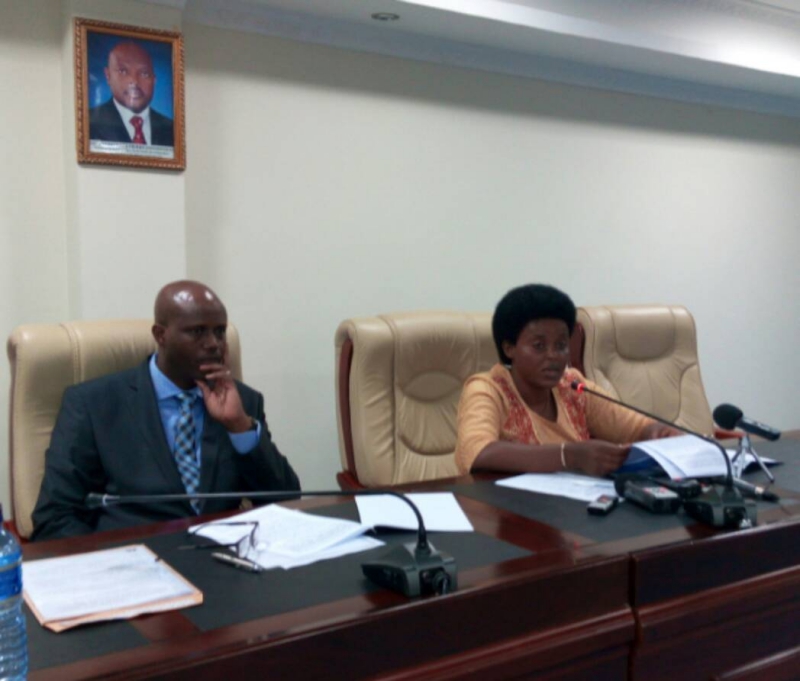
High Level National Multi-Stakeholder Advocacy Workshop on Strengthening of Pharmaceutical Laws held in Burundi
East African Community Headquarters, Arusha, 8th December, 2017:
A one-day high level National Multi-Stakeholders Advocacy and Sensitization Workshop on strengthening of national pharmaceutical laws and establishment of “autorite nationale de la regulation des medicaments et des aliments (ABREMA)” in the Republic of Burundi was held on 7th December, 2017 at the Panoramique Hotel in Bujumbura, Burundi.
The Minister in the Office of the President Responsible for EAC Affairs, Hon. Isabelle Ndahayo, officiated at the official opening ceremony of the workshop.
Addressing participants who included, among others, Members of Parliament and Permanent Secretaries, the Hon. Minister said that the EAC Partner States had agreed to, among other things, promote the management of health delivery systems and better planning mechanisms to enhance efficiency of health care services within the bloc; develop a common drug policy which would include establishing quality control capacities and good procurement practices; and harmonize drug registration procedures so as to achieve good control of pharmaceutical standards without impeding or obstructing the movement of pharmaceutical products within the Community.
The Minister commended the EAC Secretariat under the leadership of Amb. Liberat Mfumukeko for keenly following up with Partner States to ensure they implemented the directives and decisions of the Council of Ministers.
In his remarks, Amb. Mfumukeko noted that there were some directives and decisions of the EAC Council of Ministers with regard to fast-tracking regional cooperation and integration in the health sector among the Partner States and Burundi was still lagging behind hence the need for the Secretariat to come to Bujumbura to discuss with high level national stakeholders on the way forward.
He said since the year 2008, the EAC Secretariat in collaboration with the other EAC Partner States and the World Health Organization (WHO) had been making efforts to involve and build the capacity of the Republic of Burundi in the harmonization and strengthening the environment for the regulation of pharmaceuticals, medical products and various health technologies, adding that the outputs of these efforts had been minimal due to various technical and governance issues.
Amb Mfumukeko reiterated that the EAC Council of Ministers had recommended and urged all Partner States to review, update, strengthen and harmonize their respective national policies, laws, regulations, strategies, guidelines and Standard Operating Procedures (SOPs) governing the pharmaceutical sector in each Country.
Specifically, the Council of Ministers had urged each Partner State to enact and implement strong National Pharmaceutical Laws through their respective National Parliaments and also to consider and establish strong semi-autonomous National Medicines Regulatory Authorities (NMRAs) in order to promote public health and safety as well as facilitate cross-border trade in medicines, health technologies and other medical products, including enhancing local pharmaceutical manufacturing under the EAC Common Market Protocol.
The Secretary General said that it was regrettable that whereas all the other EAC Partner States had complied and implemented these decisions, Burundi was still lagging behind hence denying the country the benefits of the harmonized EAC Regional Guidelines and Standards for Medicines Evaluation and Registration, Good Manufacturing Practices, Quality Management Systems and Information Management Systems as well the Mutual Reciprocal Recognition and Technical Cooperation with other Partner States and the international medicines regulatory bodies and agencies.
The Secretary General urged the Republic of Burundi to fast-track the enactment and implementation of the Burundi National Pharmaceuticals Regulation Law that is currently before the Parliament of Burundi and also consider and build consensus on the need to establish and fully operationalize the ABREMA as a public autonomous or semi-autonomous body and legally designated to oversee effective regulation of food and medicinal products in Burundi in accordance to the regional and international best practices.
The Secretary General also urged the Government of Burundi to implement some of the pending previous decisions of the EAC Council of Ministers with regard to the strengthening and expanding the governance and regulation of health professionals and the regulation of health services delivery in the country through the establishment of the following semi-autonomous bodies or institutions to handle their respective mandates as happens in the other EAC Partner States and internationally, namely:
- i) Establishment of the “Burundi National Health Professions Authority (BNHPA” – Using the model from the Republic of Zimbabwe as agreed by all EAC Countries through the EAC Council of Ministers decisions;
- ii) Strengthening of the existing “Burundi Medical and Dental Practitioners’ Council” through legal reforms and provision of offices, infrastructure, equipment, secretariat staff and adequate funds;
iii) Establishment of the “Burundi National Nursing and Midwifery Council”;
- iv) Establishment of the “Burundi National Pharmacy Council”;
- v) Establishment of the “Burundi National Medical Laboratory Scientists, Technologists and Technicians Board”; and
- vi) Establishment of the “Burundi National Allied Health Professionals Council”.
Prior to the high-level meeting, Amb. Mfumukeko led an EAC delegation to meet and engage with the 2nd Vice President of the National Assembly, Ms. Jocky Chantal Nkurunziza and Members of the Social Affairs Committee of Parliament of Burundi on 6th December, 2017 to discuss the establishment of the ABREMA and the enactment of the Pharmaceutical Law.
-ENDS-
For more information, please contact:
Mr Owora Richard Othieno
Head, Corporate Communications and Public Affairs Department
EAC Secretariat
Arusha, Tanzania
Tel: +255 784 835021
Email: OOthieno [at] eachq.org
About the East African Community Secretariat:
The East African Community (EAC) is a regional intergovernmental organisation of five Partner States, comprising Burundi, Kenya, Rwanda, Tanzania and Uganda, with its headquarters in Arusha, Tanzania.
The EAC Secretariat is ISO 2008:9001 Certified
